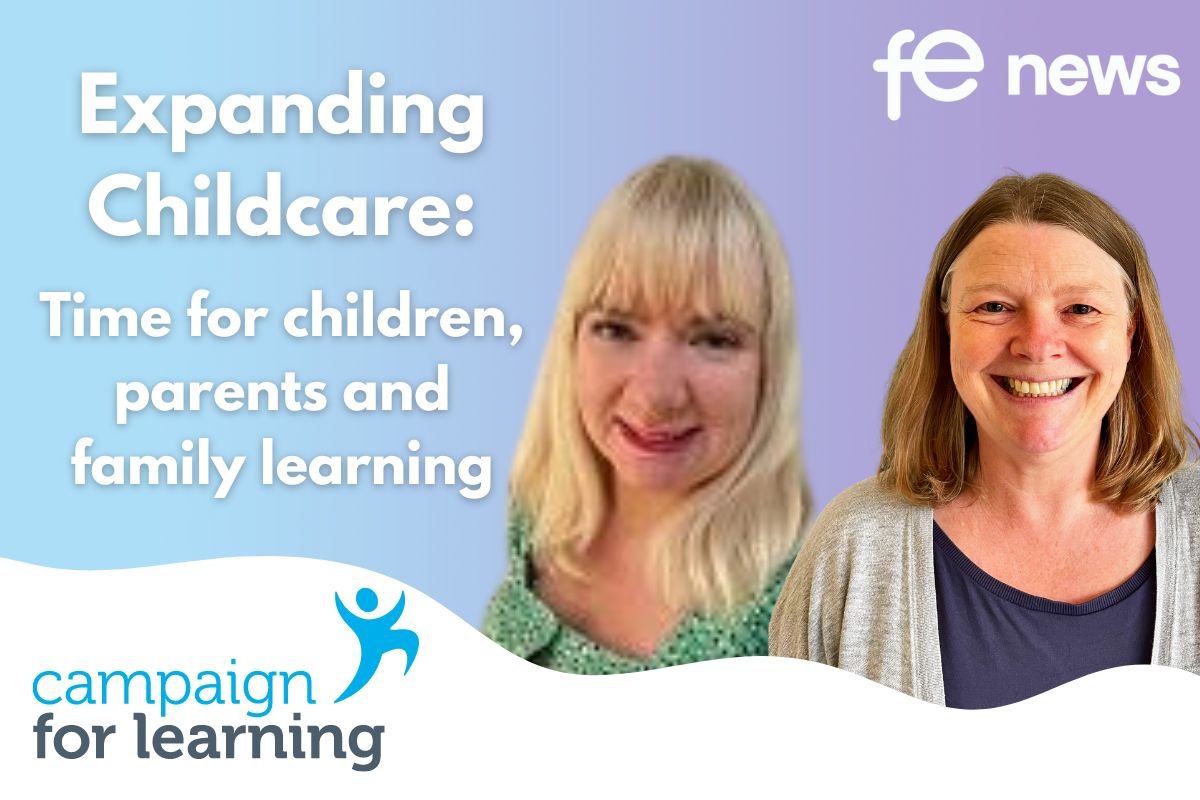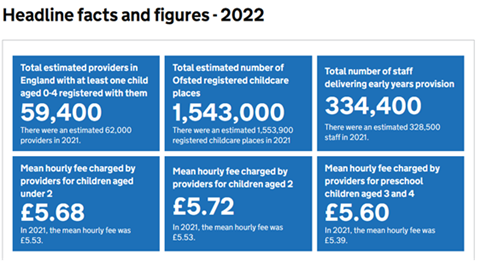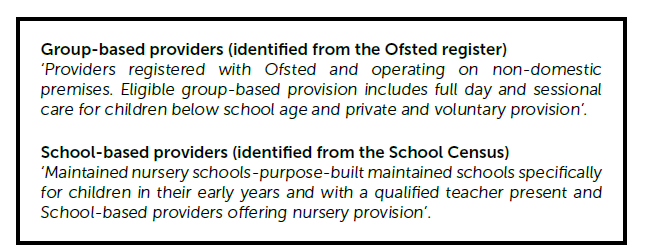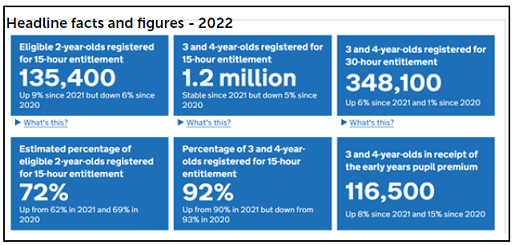The childcare sector: Providers and the workforce in England

Expanding Childcare: Time for children, parents and family learning
Both the present Conservative Government and Labour opposition plan to expand childcare in England.
A realistic assessment is needed of where the childcare sector is today to inform what needs to change to meet the planned expansion. This includes both early years education and childcare (EYEC).
Current entitlements to funded childcare
There are three main entitlements to funded childcare in England at present:
- All 3- to 4- year-olds are entitled to 15 hours funded childcare per week for 38 weeks (570 hours in total) irrespective of whether their parents are working or not;
- Parents with 3- to 4- year-olds are entitled to 30 hours funded childcare for 38 weeks (1,140 hours in total) if they each work more than 16 hours per week at the national living wage (£10.42) – equivalent to £8,670 per year – and each earn less than £100,000 per year; and
- Some 2-year-olds from households that claim qualifying benefits or have additional needs are entitled to 15 hours funded childcare per week for 38 weeks.
Providers, places and take-up
In 2022, the number of providers delivering EYEC in England was 59,400 (see Box 1), including 28,200 childminders; 21,600 group-based providers and 9,600 school-based providers (see Box 2 for definitions of group-based providers and school-based providers). This is a drop from 62,000 in 2021.
Box 1

Source: Department for Education Survey of Childcare and Early years Providers, published December 2022
Box 2

Sources: Department for Education, Education provision: children under 5 years of age, published June 2022 and Department for Education Survey of Childcare and Early years Providers, published December 2022
Together these providers offered 1.54 million Ofsted registered places in 2022: 1,044,500 group-based places, 327,900 school-based nursery places and 170,700 childminding places. Compared to 2021, this is a drop of over 10,000 places.
In 2022, there were an estimated 1.2 million 3- and 4-year-olds and 135,400 2-year-olds enrolled in the 15-hour entitlement for funded childcare. Also, approximately 348,100 3- and 4- year-olds were enrolled on the 30-hour entitlement limited to working parents who meet the eligibility criteria (see Box 3).
Box 3

Source: Department for Education, Education provision: children under 5 years of age, published June 2022
Workforce
Number of staff
There were estimated to be 334,400 early years staff (see Box 1) in 2022. The total included 248,200 group-based provision staff, 52,300 school-based provision staff, and 33,900 childminders and childminder assistants.
This was an overall increase of 5,900 (from 328,500 in 2021). While the number of school- based provider staff decreased by 3% and the number of childminders and childminder assistants decreased by 12%, the number of group-based provider staff increased by 5%.
About 45% of early years and childcare staff were employed by group-based providers and 38% by school-based providers (DfE, 2022b).
Most staff are females under 40
The majority (98%) of all staff (including temporary staff) were female and most were aged 25 to 39 years old (DfE, 2022b).
Private group-based providers had the most staff under 25 years old (23%) and had the biggest percentage increase in staff between 2021 and 2022 (a 9% increase). Childminders included the most staff aged 50 years old or older (42%).
On average, school-based providers had five staff members and group-based providers an average of 11 staff members.
Temporary staff and voluntary workers
Since 2021, the number of temporary staff had increased by 11%, the number of voluntary workers was up by 44% and the number of apprentices rose by 32%.
Jobs with apprenticeships
There has been an increase in the number of apprenticeships in the sector, predominantly in group-based providers. There was an increase in apprentices of 32% between 2021 and 2022 to 24,600. Nearly all of these extra apprentices (5,700 of the 6,000 increase) were in group-based providers (DfE, 2022b).
Minimum pay by broad occupation and registered providers
Approximately 3% of all jobs in the broad occupation group ‘caring, leisure and other service occupations’ were paid below the National Minimum Wage compared with 1.7% for the whole economy in 2022 (ONS, 2022). National Minimum Wage rates in 2023 are: 21- and 22-year-olds – £10.18; 18- to 20-year olds – £7.49; and under 18 year olds and apprentices – £5.28.
The National Living Wage applies to 23-year-olds and over. The rate from April 2023 was £10.42 per hour. In terms of the 334,400 staff delivering early years provision with registered providers (see Box 1), 14% of staff in school-based settings, 16% in group-based settings and 37% of childminding assistants were paid below the National Living Wage in 2022 (DfE, 2022b).
Salaries
Data from Adzuna on salaries showed that across the past year, the median listed salary for vacancies in this area was £21,500, which is 33% less than the median salary of £30,000 across all vacancies (D. Muir, Adzuna blog, 2023).
Staff turnover in registered providers
Group-based providers had a staff turnover rate of 18%. School-based providers had a rate of 9%.
Vacancies
Between April 2022 – April 2023, there were 19,600 vacancies for childcare practitioners, 37,300 vacancies for childcare assistants, 14,500 vacancies for childminders and 3,300 vacancies for playworkers (D. Muir, Adzuna blog, 2023).
Growth in demand for these roles has been at a similar or higher level than for all other occupations since the pandemic low of mid-May 2020. Alongside growth in demand, however, is low interest levels for these roles amongst jobseekers, especially for practitioner roles.
Providers are consequently reporting it is very difficult to recruit (DfE, 2023).
Qualifications of staff with registered providers
82% of school-based provider staff, 80% of group-based provider staff and 74% of childminder staff have a Level 3 qualification or higher (DfE, 2022b).
Training and progression with registered providers
In terms of training and progression, the Education Policy Institute and NDNA conducted research around Covid-19 regarding the early years workforce. It found significant gaps, including in speech and language and trauma and bereavement training (NDNA and EPI, 2021).
Child ratios
In the Spring Budget, the Chancellor announced an optional relaxation in child ratios for 2-year-old children from 1:4 to 1:5 from September 2023.
Further qualification flexibilities
All settings are required to have enough staff qualified with a ‘full and relevant’ qualification to meet the legal standards for staff:child ratios.
The DfE provide a list of qualifications that meet these standards, which includes over 50 qualifications. This system is currently under consultation (until July 2023), including possibly changing the need for all Level 3 practitioners to hold a maths qualification to only requiring this of the setting manager, and reducing the number of Level 2 practitioners needed for setting ratios.
Although these courses were consolidated in the past, research on the sector’s understanding of the ‘full and relevant’ qualifications suggests that the system is confusing, and updates are needed (Morton, Nursery World, 2023).
The response to the consultation in the sector press, however, suggests that this should not be through making the qualification requirements lower, as this will reduce the quality of the provision.
Problems before expansion
Recruitment and retention
Overall, there is no doubt that the childcare sector has a significant recruitment and retention problem.
Local Authorities not using funding correctly
There is evidence that the funding devolved to local authorities by DfE for early years education and childcare is not being used by them for early years education and childcare or not being used in the right way (I. Priestly, NDNA, 2023).
Professionalising the childcare workforce
The childcare workforce needs greater professionalisation before we embark on the expansion of the system.
Extended entitlements to funded childcare
The present Conservative Government has put in place the following plans:
From April 2024, working parents of two-year-olds will be able to access 15 hours of funded childcare – equivalent to 570 hours per year.
- From September 2024, 15 hours of funded childcare will be extended down to the age of 9 months – for working parents – equivalent to 570 hours per year.
- From September 2025, working parents of children aged 9 months and upwards will be entitled to 30 hours funded childcare per week right up to their child starting school – equivalent to 1,140 hours per year (DfE Education Hub, June 2023).
Although the entitlements are phased in, the expansion from 2024 and the reduction in staff:child ratios will put more pressure on providers, with more settings being likely to close in coming years.
Recommendation 1
Policy makers should shift their focus from childcare to education (P.Moss, 2020). Early years education should be fully-funded by the Government to bring EYEC in-line with education for 5-to 18-year-olds and the Government must urgently address the underspends in early years education by some local authorities.
Recommendation 2
The Government should introduce an Early Years Workforce Development Plan. Employers and employees need greater clarity and financial support. These need to follow a clear career path with progression points mapped out and training to be free or heavily subsidised.
Recommendation 3
A high proportion of the registered childcare workforce aged 23 and over are not paid the National Living Wage (between 14-16% of staff with registered providers and 37% of childminder assistants are paid below the National Living Wage). The National Living Wage needs to be enforced in the sector. Further, to tackle low pay in the early years education and childcare sector and recruit and retain 18 -23 year olds, the National Living Wage should be paid to all workers in the registered sector who are over 18.
By Anneka Dawson, Head of Pre-16 Education, Ceri Williams, Senior Research Fellow, and Alexandra Nancarrow, Research Fellow, Institute for Employment Studies
Campaign for Learning has released a new series of articles, Expanding Childcare: Time for children, parents and family learning.
See below when each article will be published on FE News:
Part One: Childcare the welfare state – 20th July
1. Will Snell, Chief Executive, The Fairness Foundation
Childcare and a new social contract
2. Anneka Dawson, Head of Pre-16 Education, Ceri Williams, Senior Research Fellow, and Alexandra Nancarrow, Research Fellow, Institute for Employment Studies
The childcare sector: Providers and the workforce in England
Part Two: Childcare and time for work – 21st July
3. Paul Bivand, Independent Policy Analyst
Women, employment and childcare
4. James Cockett, Labour Market Economist and Claire McCartney, Policy Adviser, Resourcing and Inclusion, CIPD
The planned childcare entitlements and progression into work
5. Jane van Zyl, Chief Executive, Working Families
Combining flexible working and childcare to solve the childcare crisis
Part Three: Childcare and time for child development – 24th July
6. Janeen Hayat, Director of Collective Action, Fair Education Alliance
Improving childcare quality to support educational outcomes
7. Megan Jarvie, Head of Coram Family and Childcare
Making a step change to child development through childcare
8. Professor Elizabeth Rapa and Professor Louise Dalton, University of Oxford
Childcare, children’s development and education outcomes
Part Four: Childcare and time for parental engagement – 25th July
9. Lee Elliot Major, Professor of Social Mobility, University of Exeter
The childcare revolution: A new opportunity for parental partnerships in child learning
10. Bea Stevenson, Head of Education, Family Links the Centre for Emotional Health
Childcare and parental engagement in child learning
Part Five: Childcare and time for adult skills – 26th July
11. Simon Ashworth, Policy Director, AELP
The new childcare entitlements and skills bootcamps
12. Sharon Cousins, Vice Principal, Newham College and National Association for Managers of Student Services Executive
The new childcare entitlements and access to further education
13. Susan Pember, Policy Director, HOLEX
A thriving society means linking the new childcare entitlements to adult learning
Part Six: Childcare and time for family learning –
27th July
14. Sam Freedman, Senior Fellow, Institute for Government
The childcare revolution and family learning
15. Susan Doherty, Development Officer – Family Learning, Education Scotland
Family learning and childcare: Lessons from Scotland
28th July
16. Susannah Chambers, Independent Consultant
Bringing childcare and family learning together
17. Henriett Toth, Parent
Family learning and childcare: A personal experience











Responses